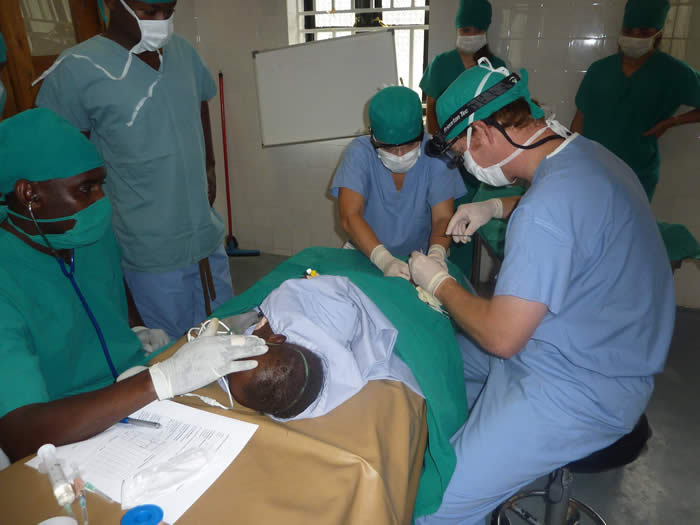

Surgery in Uganda
by Dr. Seth Frenzen
Surgery in developing nations is different from surgery in the United States. For many this fact is a given, but our trip to southwestern Uganda this summer made me question why that is the case. My wife and I have worked in other developing nations and I never questioned the vast divide between surgery at home versus surgery abroad, but in Uganda we were met with a different situation. In Uganda the healthcare workers take pride in their work. They are willing to work long hours and they are excited to learn. They are adequately trained and have the option of additional training after medical school. On the surface, then, there should be no difference between surgery at home and surgery at the Bwindi Community Hospital.
What became painfully apparent during our week in Bwindi was that there is a stark difference in surgical practices and that difference is due to resource inequity. Bwindi Community Hospital operating room has no anesthesia machine. It has no electrocautery unit and no tourniquet box. All of their suture fits on a small shelf; almost all of it is outdated. The operating room lights work, but heat up the operative field to truly uncomfortable levels. The air-conditioner in the OR is more accurately characterized as a fan. At Bwindi it is surprising that surgery is not more different. I know of many anesthesiologists in the US who would balk at doing some of the cases we did under regional anesthesia and many surgeons who would refuse to operate without their special tools. And yet the surgeons and staff at Bwindi make it work.
Bwindi needs an anesthesia machine. While in Bwindi we saw one man and one young woman die specifically because no anesthesia machine was available. Our team was unable to do several of the more complex orthopedic cases because of the lack of this equipment. The anesthesiology staff at Bwindi is very good at providing regional and spinal anesthesia, but what happens when a block does not work or a spinal wears off in the middle of a case? Patients are unavoidably forced to deal with pain with no real backup plan. Why? It is not because of a lack of knowledge or a lack of care. It is not a lack of work ethic or a failure to plan ahead. It is due to a lack of a basic operating room resource, one in America that we take for granted.
***
"The need for operations in the Bwindi area has grown rapidly with many patients now being referred to our Hospital from other health units. The challenge we are facing is that our mode of administering anesthesia is poor and risky for bigger emergency operations. We are currently using spinal injections and katamine especially on women with ruptured uterus (which we do about 5 every month) plus other life saving laparotomies. This mode of anesthesia also does not allow us do major operations on children who are usually referred to other hospitals (the nearest being 250kms away) but most times these children don’t make it. Having an anesthetic machine would therefore mean we shall be able to save the lives of these kids and be able to handle bigger emergency operations with reduced risks."
- Okello Lwanga, Communications Officer Bwindi Community Hospital
***
"The Operating Theatre team in Bwindi is led by Dr. Julius Nkalubo, who first came to Bwindi as a Medical Student from Mbarara University. His team performs an average of one major operation a day, although many times they will perform two or three surgeries throughout the day and late into the night. The most common procedure is a Caesarean Section, and we also perform hernia repairs, dental extractions, and a number of other minor surgical procedures.
Julius holds a weekly surgical clinic and manages other cases, and plans to invite visiting surgeons to come to Bwindi to help him with difficult cases. He wants to improve the quality of his equipment, introducing an anaesthetic machine and better lighting in the minor theatre."
- quoted from Bwindi Community Hospital's website

|